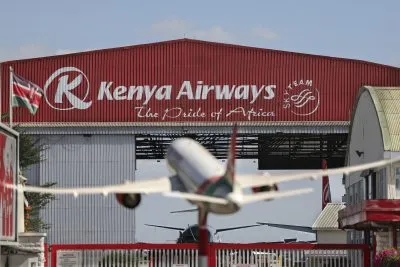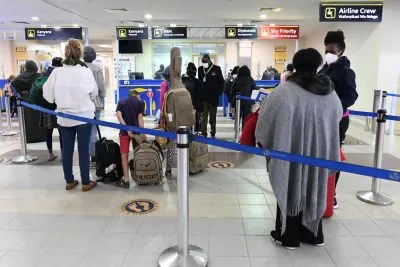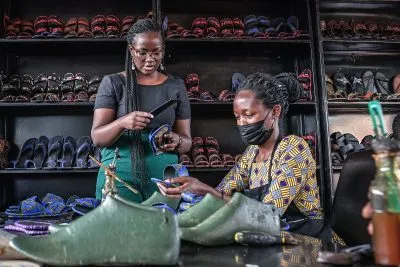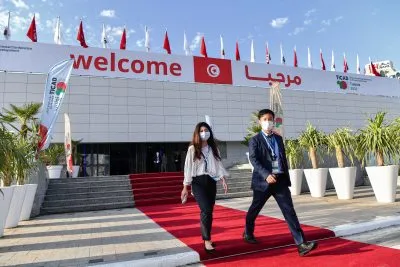As threats of global recession emerge and oil prices dive, Nigeria is dusting off its diversification toolkit to bolster its economy against hard times.
The country of 200m people is battling challenges on many fronts as it is buffeted by a sudden and dramatic drop in oil prices and a global slowdown resulting from the coronavirus outbreak in key economies, including some of its biggest trading partners. Stocks have fallen to four-year lows and reserves continue to plummet. In late March, the Central Bank of Nigeria “adjusted” the currency, but denied it was a devaluation.
As the global environment worsened in March and the number of virus cases started to grow in Nigeria itself, the government of President Muhammadu Buhari reacted swiftly to the immediate challenges. The oil price of $57 per barrel on which the 2020 budget is based, fell to $30 in mid-March as the country became a victim of a price war between major oil producers, notably Saudi Arabia and Russia.
The International Energy Agency has described the situation in the oil sector as being one of “extraordinary uncertainty”. The early slowdown in China in 2020, the epicentre of the first virus outbreak, meant Nigeria has been sitting with unsold cargoes. Its woes are compounded by the fact that the country is a high-cost producer, with a barrel of oil costing about $30 to produce while Saudi Arabia can produce the commodity for about $5 per barrel.
The government has also cancelled its plans to borrow $22.7bn from foreign institutions to support various national plans. The minister of finance, budget and national planning, Zainab Ahmed, said the government would instead prioritise its expenditure to focus on capital projects that would create jobs and on projects to improve the ease of doing business in the country. Everything else would have to wait until further notice. It also approved reductions in the capital budget by 20%, and recurrent expenditure by 25%.
Flights to more than a dozen overseas destinations were cut to prevent the spread of the virus, which has come to Africa through travellers from affected countries elsewhere.
Nigeria has battled to emerge from the aftershocks of the 2016-17 recession, precipitated by a severe long-term decline in the oil price from 2014 coupled with lacklustre economic policy, serious infrastructure deficits and persistently weak consumer demand.
Buhari, who now faces the possibility of the second recession of his tenure, has admitted the situation is challenging. “The economy is the most delicate and sensitive of all aspects of national life. A little change in the matrix can lead to major disruptions in the national economy.
“For example, international changes in oil prices, bad harvests, conflicts in strategic global locations, a major epidemic or pandemic like the current coronavirus, tariff changes in major world economies, to mention only a few examples that readily come to mind, can significantly affect our plans.”
But economists believe that the government itself has not done enough to boost growth in Africa’s largest economy. Buhari’s second term has been plagued by many of the problems of the first term, leaving the country precariously positioned to deal with exogenous shocks.
The IMF was among those who have criticised the government’s economic policies, saying reform has been slow and ad hoc. It urged Buhari to introduce a comprehensive package of reforms to increase the economy’s resilience. After a team visited Nigeria in February, the organisation cut its prognosis for the country’s 2020 growth from 2.5% to 2%.
“The pace of economic recovery remains slow, as declining real incomes and weak investment continue to weigh on economic activity,” reported the Fund. Inflation is rising, driven by higher food prices resulting from border closures, while external vulnerabilities are increasing, reflecting a higher current account deficit and declining reserves that remain highly vulnerable to capital flow reversals, it said.
Andrew Nevin, a partner at PwC Nigeria, says Nigeria needs to focus on structural change. It needs to do fewer things and do them well. Growth should be at 6% to 8%. At current rates, it is still below population growth.
“A fundamental issue is how the government plans to remain relevant to Nigerians because Nigerians have moved on.” A new social contract is needed to unify a vision for the country. “There is no silver bullet for Nigeria. It is just too big.”
The government has yet to take advantage of the billions of dollars sent into the country by the Nigerian diaspora, he says. In 2019, the amount was at least $25bn, representing a significant chunk of last year’s $29bn national budget.
There have been many positive developments in infrastructure as a result of Buhari’s strategy of Nigeria spending its way out of recession. The government has moved forward on a number of infrastructure projects, particularly in the transport sector, that have been stuck in the pipeline for years.
The presidency says new railways are reaching completion and thousands of kilometres of road have been constructed or rehabilitated. More than 100 abandoned or uncompleted projects relating to irrigation, dams, drainage and water supply are being tackled.
The process of economic management was given a boost in 2019 with the appointment by the president of a top economic team comprising respected independent economists chaired by Doyin Salami, formerly on the Central Bank of Nigeria’s monetary policy team, former CNB governor Charles Soludo and renowned economist Bismarck Rewane.
The currency conundrum
One of the thorny problems of Buhari’s rule has been the push to manage the currency and the creation of multiple exchange rates. Multiple pegged exchange rates a are not favoured by the new economic team, nor many investors.
The Nigerian central bank devalued the official currency rate by 15% on Friday, in a move to converge a multiple exchange rate regime that has existed for the past few years. The CBN has scrapped the official rate, pegged at around N306, for N360, the rate used by the Investors and Exporters foreign exchange window. The CBN denies it is a devaluation, saying it is an adjustment. But the apex bank has been under pressure to get rid of multiple exchange rates for some time.
The move appears to have been given impetus by the crashing oil price coupled with the dramatic decline in foreign reserves, mostly due to the CBN’s efforts to defend the naira, talk of devaluation is rife. Reserves fell by nearly 20% to $36.2bn in February 2020, down from $45.1bn in June 2019.
The central bank has, in an effort to rebuild its stockpile, introduced new naira futures contracts of up to five years. The aim is to attract more foreign investment by helping investors hedge their currency exposure. But with the oil price shift, managing this problem will be tricky.
To the disappointment of investors, the government has focused on saving foreign exchange, restricting importers’ access to dollars and even closing its land borders to trade. The aims is to stop the smuggling of food and the import of goods that it believes the country has the capacity to produce, as well as to stem the flow of subsidised fuel into neighbouring countries, where it is more expensive.
Import substitution underpins the country’s industrialisation strategy and is being leveraged by companies such as the Dangote Group, which hopes to save the country $10bn annually in foreign exchange by refining Nigeria’s oil locally.
Investment sentiment
Investment into Nigeria has been declining over the past few years, even after the country emerged from the 2016 recession. According to UNCTAD, FDI to West Africa declined by 15%, to $9.6bn in 2018, largely due to Nigeria, where flows plunged by 43% to $2bn.
The total value of investment announcements made in 2019, as measured by the Nigerian Investment Promotion Commission (NIPC), was down by more than 200% compared with 2018. This has been attributed to election uncertainty in 2019, in which Buhari won a second term, and the accompanying concern around his protectionist economic policies.
The NIPC said that it had tracked 76 new projects in Nigeria in 2019, with these being located in 17 of the 36 states and in the oil and gas sector in offshore Nigeria. Many states had no new investment at all.
Nigeria’s top source of capital flows in 2019 were the UK ($11bn), the US ($4.7bn), South Africa ($2,4bn), and Singapore ($1.02bn). Others are the UAE, Netherlands, Belgium, Switzerland and France.
Nigerian Economic Summit Group (NESG) CEO Laoye Jaiyeola says currency risk is preying on investors’ minds in the current volatile environment.
He says the government needs to make structural reforms including getting rid of the costly fuel and power subsidies. This will help the government to create jobs and improve its ability to balance the books. However, this will prove to be difficult in the current environment.
He says while some sectors are showing growth, in reality demand is flat, with many consumer multinationals having reported disappointing results recently.
NIPC executive secretary Yewande Sadiku says in her engagement with investors that the main concerns relate to corruption and security. Other areas of worry include the policy uncertainty, particularly over a long-term investment horizon. Power and other infrastructure deficits are a recurring complaint.
“To put this into context, investors are not as worried about power and infrastructure as these are problems they face coming in and they can make a plan to mitigate them. But political stability is more difficult to plan for.”
However, the size of the market remains a draw and despite current challenges, many investors want to be in pole position to take advantage when the economy improves, she says.
Security
Nigeria is fighting insecurity on several different fronts, including the ongoing attacks of the radical Islamist group Boko Haram in northeast Nigeria, clashes between nomadic herdsmen and farmers, and a rise in kidnappings for ransom.
The Boko Haram conflict has been running for a decade, with an estimated 27,000 people killed since the start of attacks in 2009, according to the UN Office for Coordination of Humanitarian Affairs. Buhari vowed to quell the violence and has had some success but ongoing clashes dent investor confidence.
Violent clashes between heavily armed northern nomadic herdsmen and farmers have spread from the Middle Belt to Delta State in the south. The attacks have resulted in thousands of deaths and the government has yet to find an effective way of preventing this worsening insecurity.
In response to this crisis, six states in the southwest of the country have set up their own security force to complement state security, known as Operation Amotekun.
Facing a rocky ride
In the short term, Nigeria faces a rocky ride as the coronavirus pandemic and accompanying oil price decline decimate growth and exports. The government’s swift macroeconomic interventions and scaling up of efforts to deal with the emergency have been timely, but the country remains hugely exposed.
The government has announced it will be rolling out long-delayed reforms over the coming weeks. But the failure to drive economic diversification more decisively over the longer term will, despite frequent warnings, again come back to bite.
Want to continue reading? Subscribe today.
You've read all your free articles for this month! Subscribe now to enjoy full access to our content.
Digital Monthly
£8.00 / month
Receive full unlimited access to our articles, opinions, podcasts and more.
Digital Yearly
£70.00 / year
Our best value offer - save £26 and gain access to all of our digital content for an entire year!
 Sign in with Google
Sign in with Google 



